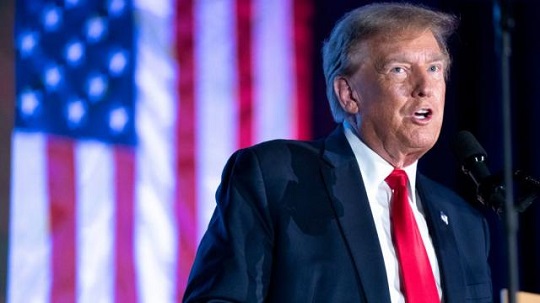The US Supreme Court on Wednesday agreed to decide Donald Trump's claim of immunity from prosecution on charges brought by a special counsel involving his efforts to overturn his 2020 election loss, further delaying Trump's criminal case as he seeks to regain the presidency.
The justices put on hold the criminal case being pursued by Special Counsel Jack Smith and will review a lower court's rejection of Trump's claim of immunity from prosecution because he was president when he took actions aimed at reversing President Joe Biden's election victory over him.
Trump's lawyers had requested a stay of that ruling, warning of dire consequences for the presidency absent such immunity.
Trump, the first former president to be criminally prosecuted, is the frontrunner for the Republican nomination to challenge Biden, a Democrat, in the Nov. 5 US election.
The case once again thrusts the nation's top judicial body into the election fray, as the justices are due to issue a ruling on whether to overturn a decision by Colorado's top court that barred Trump from the state's Republican primary ballot based a constitutional provision regarding insurrection.
The justices set the case for oral argument during the week of April 22 on a single question: "Whether and if so to what extent does a former president enjoy presidential immunity from criminal prosecution for conduct alleged to involve official acts during his tenure in office."
The US Court of Appeals for the District of Columbia Circuit on Feb. 6 ruled 3-0 against Trump's immunity claim, rejecting his bid for "unbounded authority to commit crimes that would neutralise the most fundamental check on executive power — the recognition and implementation of election results."
Smith in August 2023 brought four federal criminal counts against Trump in the election subversion case.
A March 4 trial date was postponed as Trump pressed his immunity claim, with no new date yet set. He has trials pending in three other criminal cases.
Trump has pleaded not guilty in all of them, seeking to portray them as politically motivated.
His lawyers asked the Supreme Court on Feb. 12. In a filing to the Supreme Court, they said a months-long criminal trial would "radically disrupt" Trump's ability to campaign against Biden.
They also warned of dire consequences for future presidents if Trump's prosecution is allowed such as partisan prosecutions, extortion, blackmail and more.
Smith's charges accused Trump of conspiring to defraud the United States, obstructing the congressional certification of Biden's electoral victory and conspiring to do so, and conspiring against right of Americans to vote.
Trump and his allies made false claims that the 2020 election was stolen and devised a plan to use false electors to thwart congressional certification of Biden's victory.
Trump also sought to pressure Vice President Mike Pence not to allow certification to go forward. Trump's supporters attacked the Capitol in a bid to prevent the certification.
If Trump regains the presidency, he could seek to use his powers to force an end to the prosecution or potentially pardon himself for any federal crimes.
Trump last October sought to have the charges dismissed based on his claim of immunity from criminal prosecution related to actions taken by a president while in office.
US District Judge Tanya Chutkan rejected that claim on Dec. 1, prompting Trump's DC Circuit appeal.
During arguments in January, one of Trump's lawyers told the three DC Circuit judges that even if a president sold pardons or military secrets or ordered a Navy commando unit to assassinate a political rival, he could not be criminally charged unless he is first impeached and convicted in Congress.
'Above the Law'
In its unanimous decision rejecting Trump's immunity claim, the three-judge panel wrote: "We cannot accept that the office of the presidency places its former occupants above the law for all time thereafter."
The Supreme Court's 6-3 conservative majority includes three justices appointed by Trump.
The justices heard arguments on Feb. 8 in another case involving Trump with implications for the November election. The justice signaled skepticism toward a ruling by Colorado's top court that barred Trump from the state's Republican primary ballot, based on language in the US Constitution's 14th Amendment, after finding he engaged in an insurrection related to the Jan. 6, 2021, attack on the Capitol by his supporters.
The Colorado and immunity cases put the Supreme Court in the election spotlight in the most direct way since a 2000 ruling that effectively handed the White House to Republican George W. Bush over Democrat Al Gore.
Trump, who served in the White House from 2017 to 2021, has made sweeping claims of immunity both while in office and since leaving the White House.
Smith was appointed by US Attorney General Merrick Garland in 2022 to investigate Trump's actions in the aftermath of the 2020 election and his retention of classified documents after leaving the White House in 2021. Smith brought charges against Trump concerning both issues.
The four criminal cases pending against Trump include the two pursued by Smith, one in a Georgia state court also involving his efforts to undo his 2020 loss and one in a New York state court involving hush money paid to a porn star.
The Supreme Court in 2020 spurned Trump's argument that he was immune from a subpoena issued as part of a state criminal investigation while he was president.
In a separate case, the justices also have agreed to decide whether a man involved in the Capitol attack can be charged with obstructing an official proceeding - the congressional certification of the 2020 election results. That case has potential implications for Trump because Smith brought two obstruction-related charges.
(REUTERS)





